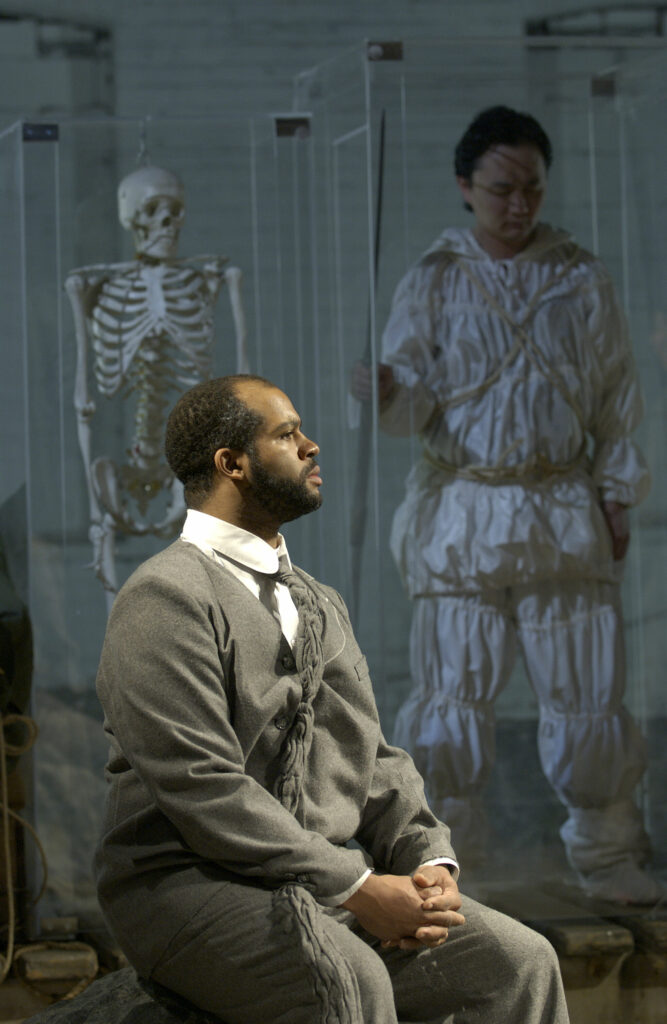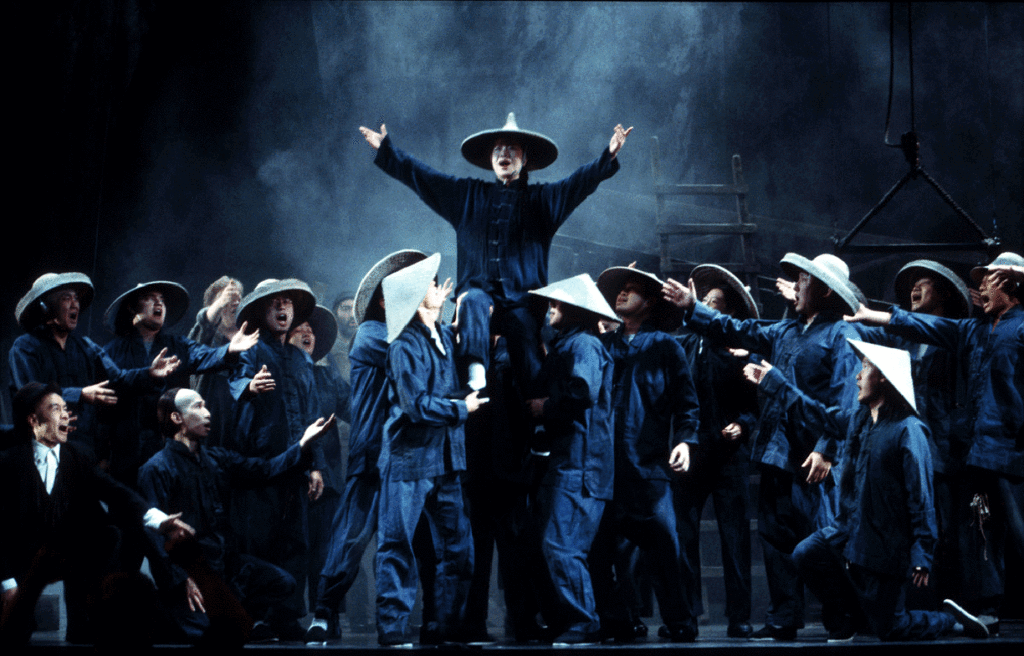Ressource sur l'opéra canadien
Ressource sur l'opéra canadien
COR
Opéras
Content warning: execution, incest, murder, sexual assault, slavery, torture, violence
Beatrice Chancy is a historical drama based upon the true story of the Cenci family of Rome, circa 1600. The story is set on a plantation in Nova Scotia during the last days of slavery, circa 1800, with the heroine Beatrice as the half-caste daughter of her...
Beatrice Chancy is a historical drama based upon the true story of the Cenci family of Rome, circa 1600. The story is set on a plantation in Nova Scotia during the last days of slavery, circa 1800, with the heroine Beatrice as the half-caste daughter of her...
Musique : James Rolfe
Livret : George Elliott Clarke
Avertissement de contenu: xénophobie, emigration
Un jeune enfant se réveille seul sur la plage. Il cherche sa mère. Le bruit des vagues étouffe les voix des gens qui s’inquiètent des nouveaux arrivants et de l’effet qu’ils auront sur leur société. D’autres voix prennent le relais : d’autres enfants disent que sa place est avec eux maintenant.
Inspired by ...
Un jeune enfant se réveille seul sur la plage. Il cherche sa mère. Le bruit des vagues étouffe les voix des gens qui s’inquiètent des nouveaux arrivants et de l’effet qu’ils auront sur leur société. D’autres voix prennent le relais : d’autres enfants disent que sa place est avec eux maintenant.
Inspired by ...
Musique : Afarin Mansouri
Livret : Marcia Johnson
Avertissement de contenu: violence coloniale, colonialisme, mort, maladie
1828, baie Notre Dame, sur la côte nord-est de Terre-Neuve. William Cormack, explorateur et anthropologue, a récemment créé le Beothuk Institute : un organisme destiné à prévenir l'extinction des premiers habitants de l'île. Après avoir appris qu'un Béothuk...
1828, baie Notre Dame, sur la côte nord-est de Terre-Neuve. William Cormack, explorateur et anthropologue, a récemment créé le Beothuk Institute : un organisme destiné à prévenir l'extinction des premiers habitants de l'île. Après avoir appris qu'un Béothuk...
Musique : Dean Burry
Livret : Yvette Nolan
Avertissement de contenu : mort, meurtre, suicide, xénophobie
Jason, an army captain and now war-hero, is returning home after years of war and an uncertain future. His interpreter and lover M’dea and their son Chase accompany him to a new life in the West. Jason begins a political career, working alongside the President and Dahlia, the President’s bea...
Jason, an army captain and now war-hero, is returning home after years of war and an uncertain future. His interpreter and lover M’dea and their son Chase accompany him to a new life in the West. Jason begins a political career, working alongside the President and Dahlia, the President’s bea...
Musique : John Harris
Livret : Marjorie Chan
Avertissement de contenu : maladie, mort, colonisation
Facing South is inspired by the life story of American Arctic explorer, Rear Admiral Robert Edwin Peary, and his contested discovery of the North Pole in 1909. The opera takes place in the inner landscape of Peary’s mind during the last hours of his life in February 1920, as he lies dying of pernic...
Facing South is inspired by the life story of American Arctic explorer, Rear Admiral Robert Edwin Peary, and his contested discovery of the North Pole in 1909. The opera takes place in the inner landscape of Peary’s mind during the last hours of his life in February 1920, as he lies dying of pernic...
Musique : Linda Catlin Smith
Livret : Don Hannah
Partition in 1947 drives Naila’s family to the new country of Pakistan while her best friend Lolo must remain in India. In a child’s-eye view of this world event, the significant concerns for these two nine-year-olds are custody of a tin box with important valuables (“marbles and flowers and keys and rings”), and the care and feeding of a pet ra...
Musique : Elisabeth Mehl Greene
Livret : Anusree Roy
Avertissement de contenu : antisémitisme, génocide, Holocauste, infanticide, meurtre, nazis, violence sexuelle, travail du sexe, violence, guerre
Still the Night tells the fictional story of two Jewish Polish cousins, both named Bryna, who have escaped from the Nazis and joined the Partisans. Along the way they are hung on crosses, raped, almost shot and forced to tu...
Still the Night tells the fictional story of two Jewish Polish cousins, both named Bryna, who have escaped from the Nazis and joined the Partisans. Along the way they are hung on crosses, raped, almost shot and forced to tu...
Musique : John Alcorn
Livret : Theresa Tova
Avertissment de contenu: mort, emprisonnement, interrogatoire, suicide, torture
A translator at a secret prison for suspected terrorists witnesses extreme torture and death of detainees. She leaks the information to news broadcasters, but the government covers it up as a hoax. Her supervisor begs her to say nothing more about the things she has seen -...
A translator at a secret prison for suspected terrorists witnesses extreme torture and death of detainees. She leaks the information to news broadcasters, but the government covers it up as a hoax. Her supervisor begs her to say nothing more about the things she has seen -...
Musique : David Ogborn
Livret : Leanna Brodie
Avertissement de contenu : descriptions d'esclavage, de violence, de violence sexuelle, de mort
A father will do anything to save his daughter. Of the Sea follows the story of Maduka, his daughter Binyelum, and fellow Africans thrown overboard during the Middle Passage who now populate mythical underwater kingdoms that span the ocean floor. Amidst the waves, ...
A father will do anything to save his daughter. Of the Sea follows the story of Maduka, his daughter Binyelum, and fellow Africans thrown overboard during the Middle Passage who now populate mythical underwater kingdoms that span the ocean floor. Amidst the waves, ...
Musique : Ian Cusson
Livret : Kanika Ambrose
Content warning: ableism, institutionalization, medical abuse, mental illness, sanism, sexual violence
10 Days in a Madhouse is a psychological opera that plays with notions of madness, inspired by the life of Nellie Bly, a trailblazing reporter who in 1887 faked madness in order to be admitted to Blackwell’s Asylum for the Insane and report ...
10 Days in a Madhouse is a psychological opera that plays with notions of madness, inspired by the life of Nellie Bly, a trailblazing reporter who in 1887 faked madness in order to be admitted to Blackwell’s Asylum for the Insane and report ...
Musique : Rene Orth
Livret : Hannah Moscovitch
Naomi’s Road, which details a young Japanese-Canadian girl’s experiences as her family is interned during World War II, is a coming-of-age story that celebrates the power of hope, cultural understanding and compassion. This compelling and emotional story is taken from one of our country’s most painful and complex social periods, a time that for ...
Musique : Ramona Luengen
Livret : Ann Hodges
Avertissement de contenu : racisme, colonialisme, violence, mort
En Chine dans les années 1880, Lai Gwan, une jeune femme appauvrie, est à l'aube d'un énorme changement. Sa mère mourante la presse de respecter et d'honorer la mémoire de son père, Manli, dont la disparition au Nouveau Monde les hante tous les deux.
Armed with the hope that she will find her father aliv...
En Chine dans les années 1880, Lai Gwan, une jeune femme appauvrie, est à l'aube d'un énorme changement. Sa mère mourante la presse de respecter et d'honorer la mémoire de son père, Manli, dont la disparition au Nouveau Monde les hante tous les deux.
Armed with the hope that she will find her father aliv...
Musique : Ka Nin Chan
Livret : Marc Brownell
Avertissement de contenu : violence sexuelle, incarcération, abus religieux, homophobie, thérapie de conversion
Through several vignettes, Forbidden examines the idea of rules and taboos. Do they protect people, or do they control them? Are they of any value, or do they simply exploit the powerless?
A young girl, punished with repetition of religious tex...
Through several vignettes, Forbidden examines the idea of rules and taboos. Do they protect people, or do they control them? Are they of any value, or do they simply exploit the powerless?
A young girl, punished with repetition of religious tex...
Musique : Afarin Mansouri
Livret : Donna-Michelle St. Bernard
Consisting of 18 scenes, the opera covers 16 years in the life of Manitoba school teacher and Métis hero Louis Riel, from the Red River Rebellion (1869–70) to the North-West Rebellion (1884–85), and his trial and hanging in Regina in 1885. It also dramatizes the political scheming in Ottawa that resulted from Riel’s actions, as well as several ...
Musique : Harry Somers
Librettistes : Mavor Moore, Jacques Languirand
Act One, Scene One
Autumn, 1915
In the park of a small town in the Crowsnest Pass, family and friends celebrate the wedding of Filumena Costanzo to Charlie Lassandro. As festivities proceed, Filumena seems withdrawn, stunned by her new husband’s brusqueness. Charlie has given her a new “Canadian” name, Florence, which she clearly rejects. ...
Autumn, 1915
In the park of a small town in the Crowsnest Pass, family and friends celebrate the wedding of Filumena Costanzo to Charlie Lassandro. As festivities proceed, Filumena seems withdrawn, stunned by her new husband’s brusqueness. Charlie has given her a new “Canadian” name, Florence, which she clearly rejects. ...
Musique : John Estacio
Livret : John Murrell
COR
Extraits
Jason, M'dea et les soldats reviennent de la guerre devant une foule en fête. Certains ne font pas confiance au nouvel étranger, M'dea.
La partition de l’Inde en 1947 oblige deux enfants à se dire au revoir. L’une d’elles part pour le Pakistan, laissant son lapin de compagnie et ses trésors d’enfance à son amie.
Le président menace M'dea de prison ou de perdre son fils si elle ne fait pas ce qu'il veut. Il la prévient de ne pas causer de problèmes à Jason.
Cormack présente ses découvertes sur Shanawdithit aux membres de l'institut Beothuk.
Shanawdithit réprimande Cormack pour son complexe de sauveur.
Cormack rencontre Shanawdithit pour la première fois. Elle travaille comme servante pour Peyton depuis cinq ans sous le nom colonial de Nancy April. Cormack est impressionné; cette femme est la dernière des Béothuks. Peyton donne la femme à Cormack, la traitent d'inutile.
The taking of Demasduit weighs heavy on Shanawdithit’s heart. Cormack, unsure of what to do, tries to comfort her, saying Demasduit was treated well. Shawnadithit asks if white people actually care about her people, her story, because Cormack’s words are betrayed by the actions of his fellows, and indeed, his own. Cormack insists he will ensure ...
Shanawdithit describes the last days of her family as they were pushed from their land and then hunted. She asks Cormack not to speak of their death, but of their life. Cormack is ecstatic and gets lost in the memories Shanawdithit paints. She breaks his reverie with the cold fact that the life she speaks of will never happen again. She collapse...
Cormack essaie de collecter des fonds pour les soins de Shanawdithit, sans succès. James Simms offre de s'occuper d'elle pendant l'absence de Cormack.
Her health fading, Shanawdithit wonders if she’ll be welcomed into the spirit world after so much time with the colonists. Cormack tells her he must leave, and Shanawdithit gives him a sketch of his house to carry with him. He leaves the room to pack. Shanawdithit hears the spirits of her people calling her name. It is time. One spirit in partic...
2003 : Après avoir divulgué sur Internet des photos de torture, la traductrice de l'armée américaine Alessandra Jenson refuse de se taire et diffuse en direct son suicide en signe de protestation.
Les ouvriers chinois sont menés à l'intérieur et Lai Gwan, déguisée, défie l'autorité du Bookman dès le début. Celui-ci cherche à son tour à se venger en donnant à Lai Gwan le travail le plus dangereux du camp : planter de la dynamite sur la paroi de la montagne depuis un panier suspendu.
Joséphine demande l'aide de Henson, malgré les mauvais traitements passés de Peary à son égard.
Les explorateurs élaborent un plan pour amener les Inuits en Amérique pour gagner de l'argent.
Henson aide Minik à atteindre le pays des morts ; Peary et Joséphine se disputent au sujet des enfants inuits de Peary.
Rempli de regrets pour sa vie, Manli chante un amour abandonné.
Lai Gwan compare son amour pour Nichol à l'attraction de l'eau fraîche de la montagne.
Lai Gwan compare son amour pour Nichol à l'attraction de l'eau fraîche de la montagne.
Lai Gwan compare son amour pour Nichol à l'attraction de l'eau fraîche de la montagne.
Lai Gwan compare son amour pour Nichol à l'attraction de l'eau fraîche de la montagne.
À Ottawa, des politiciens et des élites canadiens portent un toast au lancement du chemin de fer du Canadien Pacifique. Le contremaître du chemin de fer, James Nichol, encourage les ouvriers qui frayent le chemin à travers le pays. Finalement, les impénétrables montagnes Rocheuses leur barrent la route. Le Bookman vient à leur secours. Il fournira une main-d'œuvre chinoise bon marché qui permettra à Nichol de conquérir les Rocheuses.
Jason et M'dea attendent un bébé. Les citoyens bavardent sur le couple.
Loin de la foule, Lai Gwan se baigne en secret dans un ruisseau. Nichol arrive et découvre que Lai Gwan est une femme. Lai Gwan le supplie de ne le dire à personne. Elle serait une paria. Le Bookman entre brusquement. Embarrassés, Lai Gwan et Nichol se séparent. Le Bookman, suspicieux, conduit Lai Gwan au loin, laissant Nichol seul pour décider s'il devrait l'aider ou non.
Les travailleurs chinois décident de faire grève, menés par Lai Gwan, après un nouveau décès sans funérailles dignes de ce nom. La grève est réprimée et Nichol empêche Lai Gwan d'être pendu par Manli. Elle découvre que Manli est son père.
Lai Gwan rêve. Ama enseigne à la jeune Lai Gwan les cinq éléments du taoïsme : le métal, le bois, l'eau, le feu et la terre. Les voix d'Ama, de Nichol, de son père et de ses ancêtres se mêlent dans son rêve.
Alors que Manli et Lai Gwan se disputent sur leur situation, Lai Gwan raconte la mort d'Ama, qui écrase Manli. Il décide de poser lui-même la prochaine charge explosive. Nichol et Lai Gwan reconnaissent leur amour et suivent Manli dans le tunnel.
Quelques années plus tard, les ouvriers chinois entendent au loin un bruit inquiétant. Le premier train se fraye un chemin à travers les montagnes en direction d'Eagle Pass.
Les bosses font la fête à Eagle Pass. Donald Smith donne le coup de marteau final... mais le rate. Les ouvriers chinois rient. Smith les pousse « hors du tableau ». Un berger annonce que les Chinois ne sont plus nécessaires. Les ouvriers chinois se lamentent. Les plus pauvres seront dispersés comme du riz dans tout le pays. À la fin, il n'y a plus personne pour ramasser les os des morts. Lai Gwan s'avance et dit qu'elle va exercer les droits sacrés de l'enterrement.
Un enfant se promène sur une plage, à la recherche de ses parents.
Le père de Dahlia l'encourage à séduire Jason et lui promet qu'elle peut avoir tout ce qu'elle veut.
Lors d'une fête, le caporal se moque de Jason pour avoir eu besoin de M'dea pour l'aider à gagner et pour l'avoir ramenée à la maison.

















